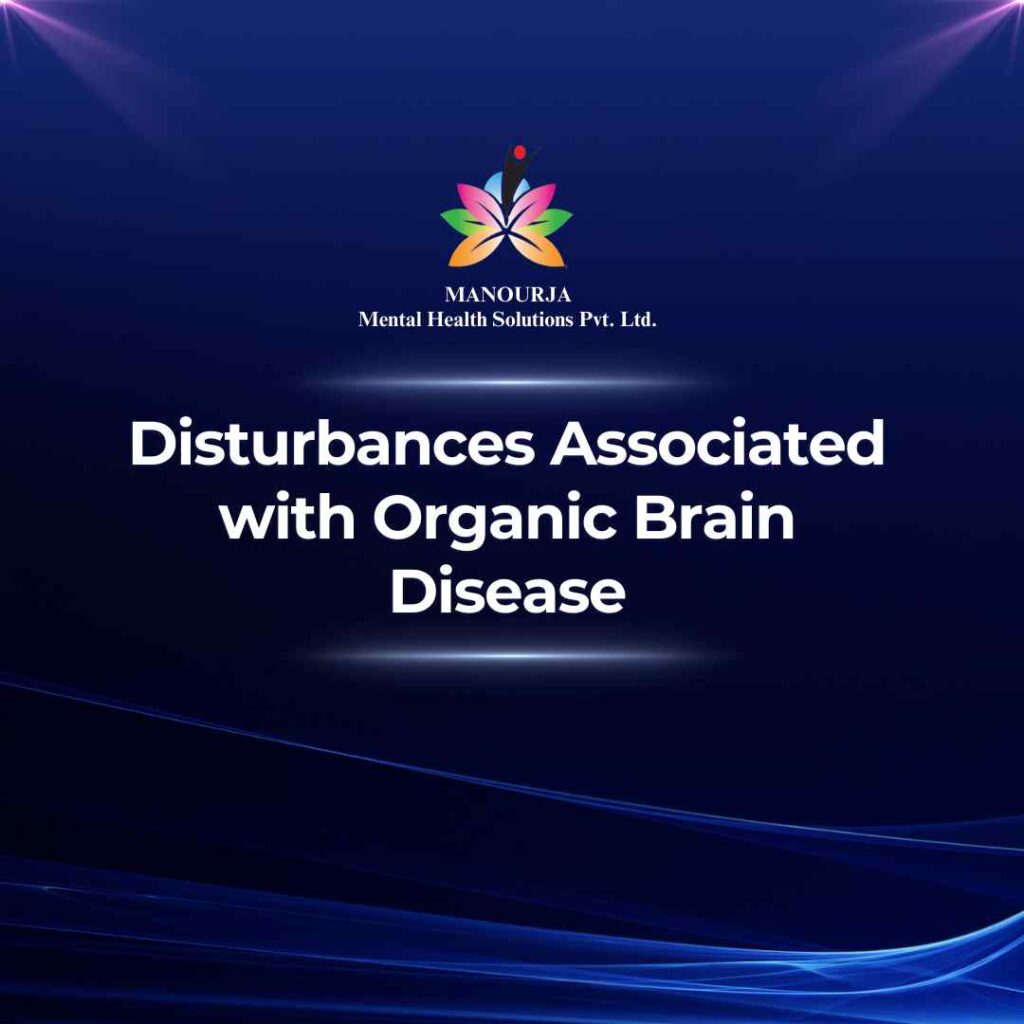Disturbances Associated with Organic Brain Disease

Disturbances associated with organic brain disease refer to a range of cognitive, emotional, and behavioral symptoms resulting from physical damage or dysfunction in the brain. Unlike purely psychological disorders, these disturbances have a clear biological basis and are often due to conditions such as brain injury, neurodegenerative diseases, infections, or other medical issues affecting brain function.
Disturbances as Signs and Symptoms of Mental Illness
The symptoms of disturbances associated with organic brain disease can be diverse, reflecting the specific area and extent of brain damage. Common signs and symptoms include:
- Cognitive Impairments: Memory loss, difficulty concentrating, poor judgment, and impaired problem-solving skills.
- Emotional Changes: Depression, anxiety, irritability, mood swings, and emotional instability.
- Behavioral Changes: Apathy, aggression, disinhibition, and changes in personality or behavior.
- Perceptual Disturbances: Hallucinations and delusions.
- Motor and Coordination Issues: Weakness, tremors, difficulty walking, and other motor impairments.
- Language Difficulties: Problems with speech, understanding language, reading, or writing.
Mental Illnesses Where These Disturbances Are Present
Alzheimer’s Disease is a progressive neurodegenerative disorder characterized by severe memory loss, cognitive decline, and behavioral changes. It is the most common cause of dementia in older people.
Parkinson’s Disease is a neurodegenerative disorder that primarily affects movement but can also cause cognitive impairments, mood disturbances, and changes in behavior as it progresses.
Huntington’s Disease is a genetic disorder that causes the progressive breakdown of nerve cells in the brain, leading to cognitive decline, psychiatric symptoms, and motor dysfunction.
Vascular Dementia results from reduced blood flow to the brain, often due to stroke or other vascular conditions. It can cause cognitive impairments, confusion, and mood changes.
Traumatic Brain Injury can result from a blow to the head, leading to a range of cognitive, emotional, and behavioral disturbances depending on the injury’s location and severity.
- Brain Tumors
Brain Tumors can cause various neurological and psychiatric symptoms, including cognitive impairments, personality changes, and emotional disturbances, depending on their location and size.
- Multiple Sclerosis (MS)
Multiple Sclerosis is an autoimmune disorder that affects the central nervous system, leading to physical symptoms, cognitive changes, and emotional disturbances.
- Infections of the Brain (e.g., Encephalitis)
Infections such as Encephalitis can cause inflammation of the brain, leading to symptoms like confusion, memory loss, seizures, and behavioral changes.
Chronic alcohol abuse can lead to Alcohol-Related Brain Damage (ARBD), including Wernicke-Korsakoff syndrome, which causes severe memory impairments and other cognitive deficits.
Delirium is an acute, often sudden onset of confusion, attention deficits, and disorientation, typically resulting from a medical condition, substance intoxication, or withdrawal.
Conclusion
Disturbances associated with organic brain disease encompass a wide range of symptoms stemming from physical damage or dysfunction in the brain. These symptoms are critical indicators of various underlying neurological and medical conditions, highlighting the importance of proper diagnosis and treatment to manage and mitigate their impact on individuals’ lives.
At MANOURJA, we believe in the transformative power of counseling. Our experienced therapists offer a safe and supportive space where you can explore your thoughts, emotions, and challenges. Through personalized counselling sessions, we’ll work together to develop coping strategies, build resilience, and achieve lasting positive change. Discover the path to a healthier, happier you with MANOURJA counselling services.
MANOURJA Rehabilitation Services
At MANOURJA, we’re dedicated to helping you in rebuild your life, after difficult times. Our rehabilitation services focus on understanding what you need to move forward, whether you’re recovering from addiction, trauma, or any psychological – social challenges. We create personalized plans, that are all about helping you, regain your strength and find hope again. With a caring team by your side, you’ll have the support to make real progress and take steps toward a brighter, healthier future.
